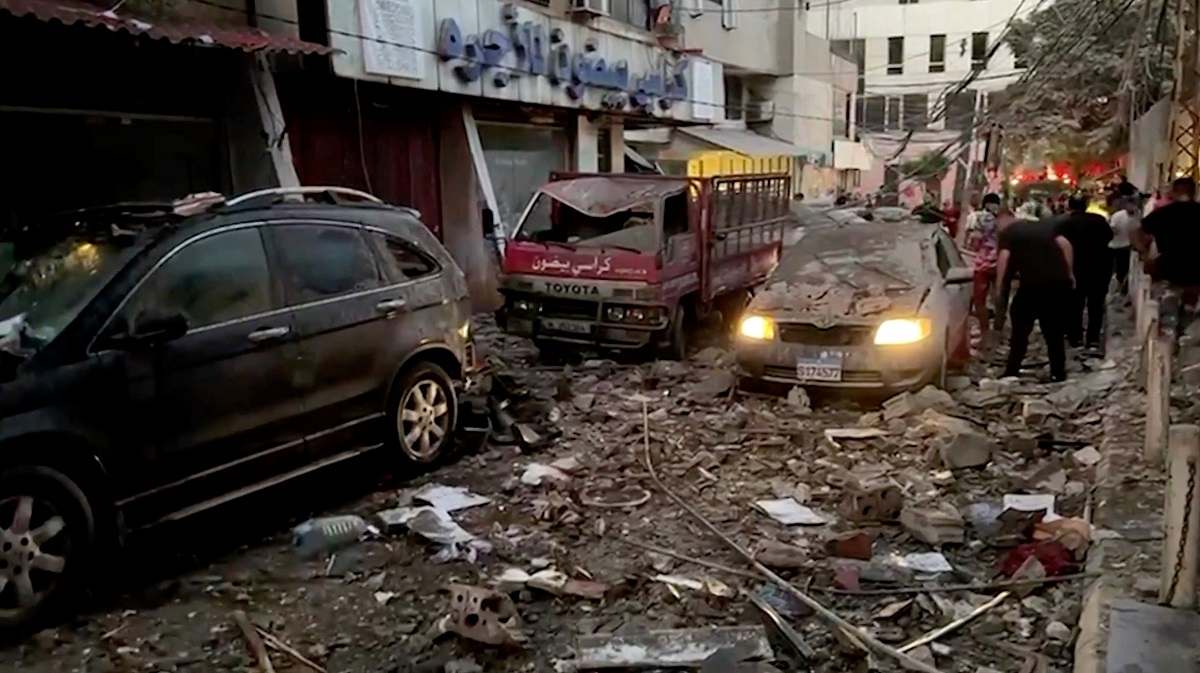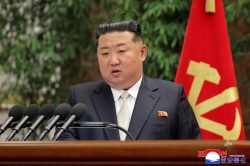
Damaged vehicles are seen after an Israeli strike on Beirut’s southern suburbs, Lebanon July 30, 2024 in this screen grab from a video.
14:14 JST, July 31, 2024
BEIRUT/JERUSALEM (Reuters) – Israel’s military claimed it killed Hezbollah’s most senior commander in an airstrike on Beirut on Tuesday, in retaliation for a cross-border rocket attack that killed 12 youngsters three days ago which it blamed on the Lebanese armed group.
A loud blast was heard and a plume of smoke could be seen rising above Beirut’s southern suburbs – a stronghold of the Iran-backed Hezbollah – at around 7:40 p.m. (1640 GMT), a Reuters witness said.
Israeli Defense Minister Yoav Gallant said the strike killed Fuad Shukr, who “has the blood of many Israelis on his hands. Tonight, we have shown that the blood of our people has a price, and that there is no place out of reach for our forces to this end.”
There was no immediate response from Hezbollah. The group has denied involvement in a rocket strike on the Israeli-occupied Golan Heights on Saturday that killed 12 youth in a football field in the Druze village of Majdal Shams.
A senior security source from another country in the region confirmed Shukr had died of wounds sustained in the strike.
Israel’s military said Shukr was the most important aide to Hezbollah Secretary-General Hassan Nasrallah, his adviser for wartime operations and in charge of Saturday’s attack.
The Israeli strike on the southern suburbs of Beirut also killed three civilians including two children, medical and security sources told Reuters.
Lebanon’s Al Manar TV cited the Lebanese health ministry as reporting 74 people injured along with three killed in the attack around Hezbollah’s Shura Council, a decision-making body, in the Haret Hreik neighborhood.
Reuters footage showed a multi-story building in the southern suburb that appeared to have a top corner sheared off. Charred debris littered the streets below, where crowds gathered to chant in support of the Hezbollah leader.
Hezbollah has denied involvement in the Golan attack, but said the group fired rockets at a military target in the Golan Heights. The killing of the youths prompted a high-level Western diplomatic flurry to avert a major escalation that could inflame the wider Middle East.
UN Special Coordinator Jeanine Hennis-Plasschaert called for calm to prevail amid escalating tensions and called on Israel and Lebanon to explore all diplomatic avenues to end hostilities.
“There is no such thing as a military solution,” she said in a statement.
Tuesday’s strike on Beirut prompted widespread condemnation by Lebanese officials and Hezbollah’s regional allies including Hamas in Gaza, the Houthis in Yemen, Syria and Iran, which backs all three of the groups.
The White House, which previously also attributed Saturday’s attack to Hezbollah, reiterated its commitment to Israel’s security against “all Iran-backed threats including Hezbollah” and said it was working on a diplomatic solution.
The Israeli military said it had issued no new instructions for civil defense in Israel, a possible indication that Israel did not plan further strikes immediately. Channel 12 TV quoted an unnamed official as saying Israel did not want an all-out war.
Israeli media reported that depending on the Hezbollah reaction, the military considered the Beirut strike as concluding the response to the Golan Heights attack.
There were about 25 rockets launched from south Lebanon into northern Israel throughout the day, the Israeli military said. Medics reported a 30-year-old man in the cooperative community of Kibbutz Hagoshrim was killed.
CONCERNS ABOUT ESCALATION
Lebanon’s foreign minister, Abdallah Bou Habib, said his government condemned the Israeli strike and planned to file a complaint to the United Nations.
“We were not expecting them to hit Beirut and they hit Beirut,” he told Reuters, saying he hoped Hezbollah’s response would not trigger an escalation.
“Hopefully any response will be proportionate and will not be more than that, so that this wave of killing, hitting and shelling will stop,” he said.
Hours before the strike, U.S. Defense Secretary Lloyd Austin said he did not believe a fight was inevitable between Hezbollah and Israel, though he remained concerned about the potential for escalation.
Hezbollah and Israel, which last fought each other in a major war in 2006, have been trading fire since the eruption of the Gaza war in October, after Hezbollah began firing at Israeli targets in what it says is solidarity with the Palestinians.
The hostilities have mostly been limited to the frontier region and both sides have previously indicated they do not seek a wider confrontation even as the conflict has prompted worry about the risk of a slide towards war.
Top Articles in News Services
-

Survey Shows False Election Info Perceived as True
-

Hong Kong Ex-Publisher Jimmy Lai’s Sentence Raises International Outcry as China Defends It
-

Japan’s Nikkei Stock Average Touches 58,000 as Yen, Jgbs Rally on Election Fallout (UPDATE 1)
-

Japan’s Nikkei Stock Average Falls as US-Iran Tensions Unsettle Investors (UPDATE 1)
-

Trump Names Former Federal Reserve Governor Warsh as the Next Fed Chair, Replacing Powell
JN ACCESS RANKING
-

Producer Behind Pop Group XG Arrested for Cocaine Possession
-

Japan PM Takaichi’s Cabinet Resigns en Masse
-

Man Infected with Measles Reportedly Dined at Restaurant in Tokyo Station
-

Israeli Ambassador to Japan Speaks about Japan’s Role in the Reconstruction of Gaza
-

Videos Plagiarized, Reposted with False Subtitles Claiming ‘Ryukyu Belongs to China’; Anti-China False Information Also Posted in Japan
























